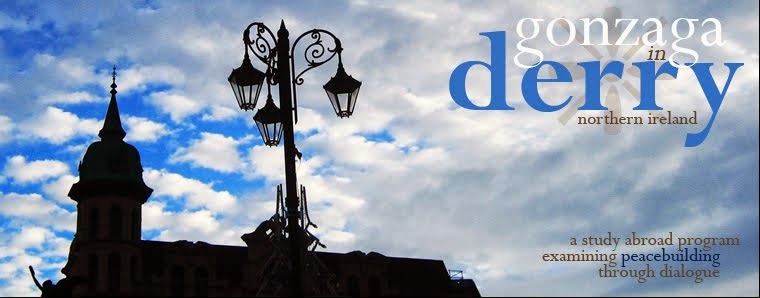By Katie Hutchens
"Stories evoke empathy. They evoke compassion. You get engaged with them."
"Stories evoke empathy. They evoke compassion. You get engaged with them."
 On a sunny and crisp afternoon in the Creggan neighborhood of Derry, school children are making their way past graffitied alley walls. Dissident messages, political slogans and bits of profanity mix with the planned, community-created artwork, forming the visual backdrop for children and adults alike. Eamonn Baker's face lights up as we pass his childhood home across from a playing field with stunning views of the ancient city and the North Atlantic. His pride in his neighborhood is touching and he apologizes for a footpath bordered by bits of rubbish and shuttered businesses. Here in Creggan, there are reminders of the past, as well as hopeful shoots for the future, such as the community-created art, a modern sports complex, and a local shopping "enterprise park."
On a sunny and crisp afternoon in the Creggan neighborhood of Derry, school children are making their way past graffitied alley walls. Dissident messages, political slogans and bits of profanity mix with the planned, community-created artwork, forming the visual backdrop for children and adults alike. Eamonn Baker's face lights up as we pass his childhood home across from a playing field with stunning views of the ancient city and the North Atlantic. His pride in his neighborhood is touching and he apologizes for a footpath bordered by bits of rubbish and shuttered businesses. Here in Creggan, there are reminders of the past, as well as hopeful shoots for the future, such as the community-created art, a modern sports complex, and a local shopping "enterprise park."
 As we walk past the the children in their school uniforms, Eamonn talks about his journey from local schoolboy, to Queen's University student, to community worker, and most recently as a training co-ordinator with Towards Understanding and Healing (TUH). The earliest glimpse he provides of his childhood consists of playing football "morning, noon and night" on the field across the street from his family home. During the troubles, he recalls seeing British soldiers positioned for shooting on that field. He also tells me about his father, a quiet man who participated in the first Civil Rights marches in 1968, and how upset he was to be on the receiving end of a government water cannon.
As we walk past the the children in their school uniforms, Eamonn talks about his journey from local schoolboy, to Queen's University student, to community worker, and most recently as a training co-ordinator with Towards Understanding and Healing (TUH). The earliest glimpse he provides of his childhood consists of playing football "morning, noon and night" on the field across the street from his family home. During the troubles, he recalls seeing British soldiers positioned for shooting on that field. He also tells me about his father, a quiet man who participated in the first Civil Rights marches in 1968, and how upset he was to be on the receiving end of a government water cannon. These days, he is a training co-ordinator at The Junction, in the Derry city center, and conducts residential gatherings and workshops as part of an EU funded program for peace and reconciliation. These encounters seek to bring together groups of people affected by the "troubles." The participants are supported and guided as they focus on dealing with their past through storytelling and positive encounter dialogue. The participants, usually former combatants or family members, tell their stories and listen to the experiences of others. These personal, heartfelt encounters invoke and evoke the power of empathy and compassion, and offer the participants a chance to redefine themselves. Post-conflict, it is common for people to define their identity in relation to their former enemy, or as a victim of their former enemy. These encounters, and the positive messaging throughout local areas, are first steps to giving residents the tools to define their own past and future.
Eamonn started by telling his story, but in doing so, he also told me the story of his neighborhood, and the people within it. While touring the streets and alleyways, we passed grassy patches and shop doorways where people had been killed or wounded, but we also saw walls painted with anti-drug slogans and murals of local sports heroes and leaders. The evolution of our conversation, and our walk, moved from the dark past to a brighter future. On a stretch of Central Drive, an area once referred to by some as "the Gaza Strip", stands the modern, Old Library Trust Healthy Living Centre. A peek through the window revealed wood flooring and spinning bikes worthy of any L.A. gym. The staff described their popular, frequently oversubscribed programs for adults, children, families, and seniors. These programs encourage healthful eating, disease prevention, smoking cessation and exercise. When people are focused on their health and well-being, they are making changes and choosing to create a better future for themselves. The positive changes can also be created mentally. Changing negative thought patterns and habits can be a powerful tool for betterment and improvement. A nearby sign reads, "If you believe in yourself anything is possible."
Just behind the Healthy Living Centre is a state of the art children's playground and football (soccer) pitch. We both comment on how the fence around the pitch is meant to keep the ball in play, rather than separate people, unlike the "peace" or "security" walls. This playground and football pitch have been built on the same field where Eamonn played football as a child.





.JPG)
No comments:
Post a Comment